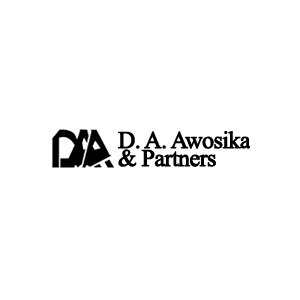Best Restructuring & Insolvency Lawyers in Nigeria
Share your needs with us, get contacted by law firms.
Free. Takes 2 min.
Or refine your search by selecting a city:
List of the best lawyers in Nigeria
Legal guides written by Adeola Oyinlade & Co:
- Procedure and Requirements for Work Permit and Visas in Nigeria
- The Step-By-Step Procedure of How to Apply for Microfinance Bank License Online in Nigeria
- How to Ensure the Smooth Recognition and Enforcement of Foreign Judgments in Nigeria
About Restructuring & Insolvency Law in Nigeria
Restructuring and insolvency law in Nigeria governs the processes and procedures for companies and individuals that are facing financial difficulties or are unable to pay their debts. The law provides frameworks for reorganizing a company’s structure, managing distressed assets, and resolving insolvency either through rescue mechanisms, voluntary arrangements, or by way of liquidation. Nigerian insolvency and restructuring law deals with both corporate and personal insolvency, aiming to protect the interests of creditors, employees, and other stakeholders while maintaining the health and stability of the financial system.
Why You May Need a Lawyer
Legal issues relating to restructuring and insolvency can be complex and financially critical. You may need a lawyer in the following situations:
- If your company is experiencing serious cash flow problems and cannot pay debts as they fall due.
- If you are a creditor seeking to recover money from a debtor who might be insolvent.
- If you are considering initiating voluntary arrangements or restructuring your debts with creditors, banks, or suppliers.
- If your company is being threatened with winding up or receivership by creditors.
- If you are a director and need to understand your legal duties and potential liabilities in an insolvency scenario.
- If you want to purchase assets or a business during a liquidation or insolvency process.
- If you are an employee or stakeholder seeking protection or clarification of your rights in a failed or insolvent business.
Lawyers can advise on the best course of action, represent you in court, and help ensure that you comply with all legal obligations during the restructuring or insolvency process.
Local Laws Overview
Restructuring and insolvency in Nigeria is governed mainly by the Companies and Allied Matters Act 2020 (CAMA) and the Bankruptcy Act, alongside other related rules and regulations. These frameworks set out the rules for liquidation, receivership, administration, and company voluntary arrangements. Key aspects include:
- Insolvency Tests: The law distinguishes between balance sheet insolvency (liabilities exceeding assets) and cash flow insolvency (inability to pay debts as they fall due).
- Corporate Restructuring Mechanisms: Provisions for schemes of arrangement, mergers, acquisitions, and company voluntary arrangements allow distressed companies to reorganize and continue their business where possible.
- Receivership and Liquidation: Creditors may appoint a receiver to manage or sell secured assets, and courts can order winding up for insolvent companies.
- Administration: This process allows for the appointment of an administrator to manage the company with the aim of rescuing it or achieving a better outcome for creditors than immediate liquidation.
- Bankruptcy Law for Individuals: The Bankruptcy Act covers personal insolvency and sets the procedure for declaring an individual bankrupt and distributing assets among creditors.
- Director Duties and Liabilities: Directors have a duty to act in the interest of creditors during insolvency and may be personally liable for wrongful or fraudulent trading.
Frequently Asked Questions
What is the difference between restructuring and insolvency?
Restructuring refers to measures taken to reorganize a financially distressed company so it can continue operating, such as renegotiating debts or organizational changes. Insolvency describes the legal state where a company or individual is unable to pay outstanding debts as they become due.
How do I know if my company is insolvent?
A company is likely insolvent if it cannot pay its debts when they are due or if its liabilities exceed its assets. Legal and financial experts can help review your situation and determine solvency status.
What are the main legal options for a distressed company in Nigeria?
Options include restructuring arrangements with creditors, schemes of arrangement, administration, receivership, or liquidation. The right option depends on the specific financial circumstances and objectives.
What happens to employees when a company is insolvent?
Employees are typically regarded as preferential creditors for certain entitlements, such as wages and benefits, during liquidation or restructuring, but may still be at risk of redundancy or loss of employment.
Can I rescue my business after insolvency proceedings have begun?
Yes, Nigerian law provides for restructuring mechanisms, such as company voluntary arrangements and administration, which may allow a business to be rescued if an agreement can be reached with creditors.
What is receivership?
Receivership is a process where a receiver is appointed, usually by a secured creditor, to take control of and realize secured assets in order to recover debts owed.
How are creditors’ claims handled in insolvency?
Creditors are generally ranked by priority. Secured creditors are paid first, followed by preferential creditors (such as employees), then unsecured creditors, and shareholders last.
What is the role of the court in restructuring and insolvency?
The court oversees many aspects such as approving schemes of arrangement, making winding up orders, and supervising the insolvency process to ensure it is fair and in accordance with the law.
Can directors be personally liable in cases of insolvency?
Directors may be personally liable if they engage in wrongful or fraudulent trading, or if they breach their duties to creditors during insolvency.
How long does insolvency or restructuring take in Nigeria?
The timeframe varies depending on the complexity of the case, the availability of records, and the cooperation of stakeholders. Some processes may take months while complex cases can extend over several years.
Additional Resources
If you need more information or assistance on restructuring and insolvency matters in Nigeria, you can reach out to the following resources:
- The Corporate Affairs Commission - Responsible for company registration and regulatory compliance
- The Nigerian Bar Association - Offers a directory of qualified insolvency and restructuring lawyers
- The Securities and Exchange Commission - Regulates aspects of mergers, acquisitions, and takeovers
- The Federal High Court of Nigeria - Handles insolvency and restructuring proceedings
- Insolvency professional associations and accounting bodies that provide guidance and further reading
Next Steps
If you are facing financial distress or require advice on restructuring and insolvency:
- Assess your situation objectively and gather relevant financial documents.
- Reach out to a qualified Nigerian lawyer or insolvency professional who specializes in this area of law.
- Discuss your options and develop a plan tailored to your specific circumstances, whether it involves negotiation with creditors, restructuring, or insolvency proceedings.
- Stay informed about your legal responsibilities, especially as a director, owner, or creditor, and follow professional advice to avoid potential liabilities or penalties.
- Consider contacting relevant government bodies or professional associations for further assistance or referrals.
Early legal guidance can make a significant difference in achieving the best possible outcome for all parties involved.
Lawzana helps you find the best lawyers and law firms in Nigeria through a curated and pre-screened list of qualified legal professionals. Our platform offers rankings and detailed profiles of attorneys and law firms, allowing you to compare based on practice areas, including Restructuring & Insolvency, experience, and client feedback.
Each profile includes a description of the firm's areas of practice, client reviews, team members and partners, year of establishment, spoken languages, office locations, contact information, social media presence, and any published articles or resources. Most firms on our platform speak English and are experienced in both local and international legal matters.
Get a quote from top-rated law firms in Nigeria — quickly, securely, and without unnecessary hassle.
Disclaimer:
The information provided on this page is for general informational purposes only and does not constitute legal advice. While we strive to ensure the accuracy and relevance of the content, legal information may change over time, and interpretations of the law can vary. You should always consult with a qualified legal professional for advice specific to your situation.
We disclaim all liability for actions taken or not taken based on the content of this page. If you believe any information is incorrect or outdated, please contact us, and we will review and update it where appropriate.
Browse restructuring & insolvency law firms by city in Nigeria
Refine your search by selecting a city.
















